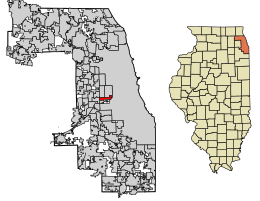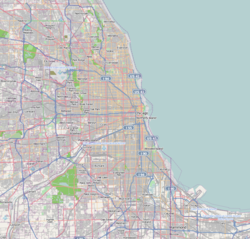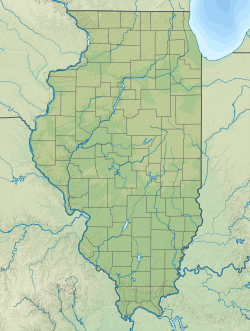Village in Illinois, United States
| Stickney, Illinois | |
|---|---|
| Village | |
 Seal Seal | |
| Motto: A Community That Cares | |
 Location of Stickney in Cook County, Illinois. Location of Stickney in Cook County, Illinois. | |
   | |
| Coordinates: 41°49′1″N 87°47′12″W / 41.81694°N 87.78667°W / 41.81694; -87.78667 | |
| Country | |
| State | Illinois |
| County | Cook |
| Township | Stickney |
| Incorporated | 1913 |
| Government | |
| • Type | Trustee-village |
| • President | Jeff Walik |
| Area | |
| • Total | 1.96 sq mi (5.08 km) |
| • Land | 1.92 sq mi (4.98 km) |
| • Water | 0.04 sq mi (0.09 km) 2.04% |
| Population | |
| • Total | 7,110 |
| • Density | 3,695.43/sq mi (1,426.59/km) |
| Up 10.38% from 2000 | |
| Standard of living (2007-11) | |
| • Per capita income | $21,972 |
| • Median home value | $204,000 |
| ZIP code(s) | 60402 |
| Area code(s) | 708 |
| Geocode | 72676 |
| FIPS code | 17-72676 |
| Website | www |
Stickney is a village in Cook County, Illinois, United States. Per the 2020 census, the population was 7,110. The village is named for Alpheus Beede Stickney, a railroad executive who played a central role in establishing the Clearing Industrial District. It was well known in the 1920s and early 1930s as the home for several bordellos linked to mobster Al Capone's empire.
Geography
Stickney is located at 41°49′1″N 87°47′12″W / 41.81694°N 87.78667°W / 41.81694; -87.78667 (41.816982, -87.786755).
According to the 2010 census, Stickney has a total area of 1.966 square miles (5.09 km), of which 1.93 square miles (5.00 km) (or 98.17%) is land and 0.036 square miles (0.09 km) (or 1.83%) is water.
Demographics
| Census | Pop. | Note | %± |
|---|---|---|---|
| 1920 | 550 | — | |
| 1930 | 2,005 | 264.5% | |
| 1940 | 2,446 | 22.0% | |
| 1950 | 3,317 | 35.6% | |
| 1960 | 6,239 | 88.1% | |
| 1970 | 6,601 | 5.8% | |
| 1980 | 5,893 | −10.7% | |
| 1990 | 5,678 | −3.6% | |
| 2000 | 6,148 | 8.3% | |
| 2010 | 6,786 | 10.4% | |
| 2020 | 7,110 | 4.8% | |
| U.S. Decennial Census 2010 2020 | |||
As of the 2020 census there were 7,110 people, 2,314 households, and 1,617 families residing in the village. The population density was 3,627.55 inhabitants per square mile (1,400.60/km). There were 2,523 housing units at an average density of 1,287.24 per square mile (497.01/km). The racial makeup of the village was 39.68% White, 2.64% African American, 3.33% Native American, 1.42% Asian, 0.04% Pacific Islander, 32.42% from other races, and 20.46% from two or more races. Hispanic or Latino of any race were 64.25% of the population.
There were 2,314 households, out of which 37.0% had children under the age of 18 living with them, 48.53% were married couples living together, 9.68% had a female householder with no husband present, and 30.12% were non-families. 27.14% of all households were made up of individuals, and 15.82% had someone living alone who was 65 years of age or older. The average household size was 3.52 and the average family size was 2.83.
The village's age distribution consisted of 26.3% under the age of 18, 4.7% from 18 to 24, 33% from 25 to 44, 22.2% from 45 to 64, and 13.7% who were 65 years of age or older. The median age was 39.0 years. For every 100 females, there were 107.2 males. For every 100 females age 18 and over, there were 122.8 males.
The median income for a household in the village was $67,246, and the median income for a family was $87,997. Males had a median income of $47,361 versus $38,373 for females. The per capita income for the village was $27,977. About 2.3% of families and 7.5% of the population were below the poverty line, including 4.5% of those under age 18 and 16.6% of those age 65 or over.
| Race / Ethnicity (NH = Non-Hispanic) | Pop 2000 | Pop 2010 | Pop 2020 | % 2000 | % 2010 | % 2020 |
|---|---|---|---|---|---|---|
| White alone (NH) | 4,689 | 3,034 | 2,111 | 76.27% | 44.71% | 29.69% |
| Black or African American alone (NH) | 17 | 138 | 168 | 0.28% | 2.03% | 2.36% |
| Native American or Alaska Native alone (NH) | 11 | 3 | 11 | 0.18% | 0.04% | 0.15% |
| Asian alone (NH) | 65 | 98 | 91 | 1.06% | 1.44% | 1.28% |
| Pacific Islander alone (NH) | 0 | 4 | 1 | 0.00% | 0.06% | 0.01% |
| Other race alone (NH) | 0 | 4 | 38 | 0.00% | 0.06% | 0.53% |
| Mixed race or Multiracial (NH) | 43 | 53 | 122 | 0.70% | 0.78% | 1.72% |
| Hispanic or Latino (any race) | 1,323 | 3,452 | 4,568 | 21.52% | 50.87% | 64.25% |
| Total | 6,148 | 6,786 | 7,110 | 100.00% | 100.00% | 100.00% |
Government
Stickney is in Illinois's 3rd congressional district.
Education
Stickney has two public elementary schools, Home School and Edison School, part of Lyons Elementary School District 103, both serving grades K-5. Students then attend George Washington Middle School in Lyons for grades 6–8.
Residents are zoned Morton West High School in Berwyn for grades 9-12 as all residents are west of Ridgeland Avenue.
The village had previously hosted Haley School which was built in 1923 and demolished in 1987; its land later being converted into Haley Park in 1989, and MacArthur School (41st and Cuyler) which was closed and later demolished. St Pius X Church had an elementary school which was closed in the 90s.
Transportation
Bus service in the village is provided by CTA and Pace.
References
- "2020 U.S. Gazetteer Files". United States Census Bureau. Retrieved March 15, 2022.
- "Stickney village, Illinois". United States Census Bureau. Retrieved April 15, 2022.
- "Encyclopedia of Chicago - Stickney, IL". Chicago Historical Society. 2005. Retrieved November 10, 2013.
- "US Gazetteer files: 2010, 2000, and 1990". United States Census Bureau. February 12, 2011. Retrieved April 23, 2011.
- "G001 - Geographic Identifiers - 2010 Census Summary File 1". United States Census Bureau. Archived from the original on February 13, 2020. Retrieved December 25, 2015.
- "Decennial Census of Population and Housing by Decades". US Census Bureau.
- ^ "P2 Hispanic or Latino, and Not Hispanic or Latino by Race – 2010: DEC Redistricting Data (PL 94-171) – Stickney village, Illinois". United States Census Bureau.
- ^ "P2 Hispanic or Latino, and Not Hispanic or Latino by Race – 2020: DEC Redistricting Data (PL 94-171) – Stickney village, Illinois". United States Census Bureau.
- "Explore Census Data". data.census.gov. Retrieved June 28, 2022.
- "P004: Hispanic or Latino, and Not Hispanic or Latino by Race – 2000: DEC Summary File 1 – Bruni CDP, Texas". United States Census Bureau.
- "1950s." J. Sterling Morton High School East. Retrieved on December 20, 2016.
- "Polling Locations for March 2012." Stickney Township. Retrieved on December 20, 2016.
- "Pioneers of Progress ... the history of Stickney Township." (Stickney Township Office, 1969), p. 25. Retrieved on December 29, 2018.
- "RTA System Map" (PDF). Retrieved February 1, 2024.
External links
| Places adjacent to Stickney, Illinois | ||||||||||||||||
|---|---|---|---|---|---|---|---|---|---|---|---|---|---|---|---|---|
| ||||||||||||||||
